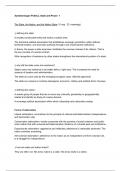Aantekeningen Politics, State and Power 1
The State, the Nation, and the Nation State (11 sep. ’23, maandag)
-} defining the state:
A socially constructed entity that marks a certain area.
The dominant political association that establishes sovereign jurisdiction within defined
territorial borders, and exercises authority through a set of permanent institutions.
In theory, the power a state exercises, facilitates the common interest of its citizens. That is
the key concept of a social contract.
Wide recognition of existence by other states strengthens the international position of a state.
-} why did the state come into existence?
States came into existence to be better able to fight wars. This increased the need for
systems of taxation and administration.
The state as a tool used by the emerging bourgeois class. (Marxist approach)
The state as a means to combine ideological, economic, military and political forms of power.
-} defining the nation:
A certain group of people that are in some way culturally, genetically or geographically
related and identify as being of a same descent.
A sovereign political association within which citizenship and nationality overlap.
Forms of nationalism
Liberal nationalism: commitment to the principle of national self-determination (independence
and democratic rule).
Conservative nationalism: mostly concerned with the promise of social cohesion and public
order (rather that with universal self-determination) Defence of a shared past and institutions.
Expansionist nationalism: aggressive and militaristic adherence to nationalist sentiment. The
nation overrides everything.
Anti-colonial nationalism: adherence to the nation as an independent unit from colonial rule,
to a struggle for independence.
-} how are state and nation linked?
They are often not. Not every nation is a state. Not every state is a nation.
,Democracy & Legitimacy (15 sep. ’23, vrijdag)
-} defining legitimacy:
‘Legitimacy is the belief that authority is exercised rightfully and appropriately’
The concept of legitimacy is closely linked to citizens’ confidence and trust in a system of
rule. Legitimacy thus transforms power into authority.
Forms of legitimacy
- Traditional legitimacy
Legitimacy based on traditions and customs (monarchies)
- Charismatic legitimacy
Legitimacy deriving from the power of an individual’s personality (one man states,
presidential republics)
- Legal-rational legitimacy
Legitimacy based on a clear and legally defined set of rules (democracies)
-} defining democracy:
Rule by the people.
Direct versus indirect democracy.
Democracies should provide:
1. The possibility of contestation: freedom of organization and expression.
2. Inclusion: the freedom to participate in the democratic process.
Polyarchy: a political regime with high levels of both contestation and inclusion.
Why do some countries democratise, whilst others do not?
- Modernization theory argues that all societies pass through the same historical stages of
economic development. With higher education and sectoral change comes governmental
change. As companies grow and pay more taxes, they request more say in how public
money should be spend.
- Cultural modernization theory argues that economic development produces a certain
cultural change. After all, co-dependency increases as industrial and service sectors come
and self-sufficient agricultural practices disappear. The idea of civic participation would
ultimately motivate democratic reform. Democratization could also be partially explained by
changing values as a result of growing wealth, in the context of the hierarchy of needs.
, The populist challenge to democracy
Threat
- focusses only on the majority of voters (‘’the real people’’), advertising anti-pluralist views.
- Weakening checks and balances which stand in the way of the ‘people’s will’.
Corrective
- broadening political representation.
- Strengthening democratic accountability in their critical approach to the ruling government.
Elections, Voting and Political Parties (18 sep. ’23, maandag)
-} defining representation:
‘Representation is, broadly, a relationship through which an individual group stands for, or
acts on behalf of, a larger body of people’
Representation is the activity of making citizens’ voices, opinions, and perspectives ‘’present’’
in public policy-making processes.
Representative democracy: the representation links government and the governed in such a
way that the people’s views are articulated, or their interests secured.
Forms of representation
- Trusteeship
A trustee acts on behalf of others using his or her superior knowledge, better education, or
greater experience. A trustee follows their own understanding of the best action to pursue.
Representation as a moral duty where the fortunate act on behalf of the unfortunate.
- Delegation
A delegate is chosen to act for another on the basis of clear guidance and instruction. A
delegate follows the expressed preferences of their constituents. Representation is the act of
conveying in the views of others, not one’s own views.
- Mandate
Corresponds to the notion of substantive representation. In elections, representatives
present a policy program which provides the representative with a mandate to make laws
and execute them.






